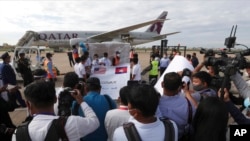Journalists in Cambodia are facing increasing threats and being prevented from doing their jobs amid growing restrictions on press freedom and civic and political rights, the U.N human rights office there said this week.
The U.N. agency's report, issued August 3, describes press freedom in Cambodia from January 2017 until local elections held this June. The findings reveal a steady deterioration of democratic rights in the country.
The report's authors say the country's media is in a perilous state as Cambodia prepares for elections again this year and in 2023. They say journalists working in the country face harassment and pressure, mainly through the criminal justice system.
Sixty-five journalists were interviewed and surveyed as part of the report. Human rights spokesman Jeremy Laurence told VOA that 80% of those surveyed said they had experienced surveillance and interference during their work.
"For years now, the authorities in Cambodia have actively adopted legislation restricting civic space generally in Cambodia and press freedoms in particular," Laurence said. "Laws and other instruments have been adopted which are empowering the authorities to censor and place journalists and others under surveillance and extend the government's ability to target media workers and freedom of expression through the courts themselves."
Laurence said the U.N. rights office in Cambodia has documented the cases of 23 journalists since January 2017 who have faced criminal charges for disinformation, defamation, or incitement because of their work.
"The wide range in powers to block information and punish unspecific crimes, they should be scrapped," Laurence said. "What I am referring to specifically are the laws — the law that was introduced around COVID-19 and the decree that was introduced earlier this year on the establishment of their internet gateway."
The law on COVID-19 measures enables the government to impose restrictions to curb the spread of infectious diseases. It contains large fines and prison sentences of up to 20 years. Journalists who oppose the measure and report on it can be, and have been, fined and punished.
The internet gateway decree, if implemented, would manage all internet traffic into and out of Cambodia. Human rights officials warn the decree gives the government wide-ranging powers to block information and punish unspecified crimes.
The U.N. human rights office submitted the draft report to the Cambodian government for factual comments June 20. It says the government's response, which was received July 6, has been incorporated throughout the report. The authors of the report have not specified the changes requested by Cambodian authorities.








